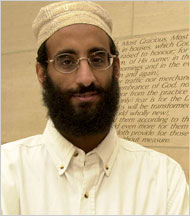Anti-Saleh protests sweep Yemen
A growing wave of protests across Yemen is mounting pressure on President Ali Abdullah Saleh to end his 32-year rule
Several thousand demonstrators turned out yet again in the capital Sanaa on Wednesday for what are now almost daily rallies against him and denied any links to the US.
“The people who come to the square are youths, free youths who have no connection whatsoever to any foreign entity, their only concern is to topple the regime,” Ali Al Sakkaf, a protester, said.
In the town of Sadr, in the country’s south, witnesses said that security forces fired tear gas and shot at hundreds of protesters, to which the demonstrators responded by setting police vehicles alight. (Al Jazeera)
Saleh accuses the US and Israel of destabilizing the Arab world
[O]n Tuesday, Saleh seemed to be turning on Washington. In a speech to about 500 students and lecturers at Sanaa University, he claimed the U.S., along with Israel, is behind the protest movement.
“I am going to reveal a secret,” he said. “There is an operations room in Tel Aviv with the aim of destabilizing the Arab world. The operations room is in Tel Aviv and run by the White House.”
Saleh also alleged that opposition figures meet regularly with the U.S. ambassador in Sanaa. “Regrettably those (opposition figures) are sitting day and night with the American ambassador where they hand him reports and he gives them instructions,” Saleh said.
The Obama administration rejected these claims. White House spokesman Jay Carney called on Saleh to focus on implementing the political reforms demanded by his people instead of “scapegoating.”
Saleh’s relationship with the U.S. has been ambivalent, and he has at times attempted to play down his military alliance with Washington. Anti-U.S. sentiment remains strong in Yemen, as elsewhere in the region, and Saleh’s comments appeared to be an attempt to discredit the protesters by suggesting they are serving foreign interests. (AP)
The looming threat of tribal war
Over the 32 years of his reign, Salih, who is a former tank commander, has paid keen attention to the tribal backgrounds of his general officers and field officers. The majority of the general officers are drawn from Salih’s tribe, the Sanhaan, and many are directly linked with his family and or extended family through marriage. Most notably, the Republican Guard and the Central Security Service, the most able and well equipped of Yemen’s armed forces, are commanded by Salih’s son and nephew respectively. The field officers’ backgrounds are more varied but are still thoroughly vetted in terms of tribal affiliations. The junior officer core is more of an unknown, but even within its ranks there are few southerners and most are still from the northern tribes from which Salih has traditionally drawn most of his support.
The tribal affiliations of Yemen’s general and field officers likely mean that Salih can expect continued loyalty from much of his armed forces, especially if threatened by a Hashid-backed alliance led by members of the al-Ahmar family. The loyalty of his general officers has been further buttressed by often exorbitant salaries that allow them to carve out fiefdoms of their own. Some of the more senior officers are in a position to guarantee the loyalty of their troops, if necessary, with cash bonuses and other perks. Many within the general and field officer cores have also sought to make sure that a majority of the enlisted men within their ranks are from their own tribes and clans, to further guarantee loyalty.
While the tribal affiliations of the Yemeni Army, especially within its officer core, are likely to guarantee a significant level of loyalty to the regime, it should be noted that the Yemeni Army’s morale suffers from poor pay and living conditions. In addition, it was dealt a blow by the prolonged war against the Houthis in northern Yemen. Salaries for enlisted men, despite Salih’s recent promise of an increase, remain low, with many soldiers owed months of back pay. Corruption is also endemic. During the last war against the Houthis (2009-2010), there were numerous reports of officers selling ammunition and supplies and leaving their troops with neither food nor bullets to fight with. (Jamestown Foundation)
Radical cleric demands ouster of Yemen leader
Yemen’s president, Ali Abdullah Saleh, maintained a tenuous hold on power on Tuesday, blaming the United States and Israel for protests across the Arab world, while a prominent radical cleric joined the growing crowds demanding his ouster and called for an Islamic state.
American officials expressed concern about the statement of the cleric, Abdul Majid al-Zindani, a one-time mentor of Osama bin Laden, which introduced a new Islamist element to the turmoil in a country where Al Qaeda is viewed as a grave threat. The protests that toppled leaders in Tunisia and Egypt and that now have spread to Libya, Bahrain and Oman have been largely secular in nature.
Mr. Zindani spoke on an open-air stage before several thousand antigovernment protesters, guarded by 10 men carrying AK-47s and shielded from the scorching sun by two umbrellas wielded by aides. “An Islamic state is coming,” he said, drawing cries of “God is great” from some in the crowd.
He said Mr. Saleh “came to power by force, and stayed in power by force, and the only way to get rid of him is through the force of the people.”
It was not clear how much support Mr. Zindani had among the protest movement. (New York Times)
Army appoints new Egyptian PM
Egypt’s governing military council has accepted the resignation of Ahmed Shafiq, the prime minister, and appointed a former transport minister, Essam Sharaf, to form a new government, according to an army announcement.
The statement was carried on the military’s Facebook page on Thursday and then confirmed by a military spokesman.
“The Supreme Council of the Armed Forces decided to accept the resignation of Prime Minister Ahmed Shafiq and appointed Essam Sharaf to form the new government,” the statement said.
The council said it had tasked Sharaf with forming a new caretaker cabinet that would oversee the country’s transition to civilian rule.
Sharaf took part in the mass rallies in Cairo’s Tahrir Square which brought down Hosni Mubarak, Egypt’s president, on February 11 after three decades in power. (Al Jazeera)
Mubarak to be questioned in corruption probe
Former Egyptian President Hosni Mubarak, who is still believed to be at his residence in Sharm el-Sheikh, will be brought to Cairo next week for questioning in his corruption case, said Mustafa Bakri, a former member of parliament.
Bakri, who brought the case against Mubarak and other officials, was told of the development by the Prosecutor General’s office on Thursday.
Attorney General Abdel Maguid Mahmoud issued an order freezing assets of Mubarak and his family on Monday and prohibited them from leaving the country. (CNN)
Iranian activists appeal to UN over missing opposition leaders
A number of prominent Iranian activists have written an open letter to United Nations Secretary-General Ban Ki-moon urging him to intervene in the case of detained opposition leaders Mir Hossein Musavi and Mehdi Karrubi, RFE/RL’s Radio Farda reports.
The letter, published on March 1 on opposition websites, calls on Ban to use all “international levers” at his disposal to ensure the welfare of Musavi and Karrubi and seek their release from detention.
Iranian officials have denied the men have been arrested or detained.
Their family, friends, and supporters along with the opposition website Kaleme, which is close to Musavi, say he and Karrubi and their wives, Zahra Rahnavard and Fatemeh Karrubi, were taken recently to Heshmatieh prison in Tehran. (RFE/RL)
Iran forces fire teargas at protesters
Iranian security forces fired teargas and clashed with anti-government protesters demonstrating against the treatment of opposition leaders, pro-reform websites reported on Tuesday.
Thousands of demonstrators poured into the streets of Tehran and other cities, chanting slogans against the government, Sahamnews reported.
“Security forces and plainclothes agents fired teargas and clashed with demonstrators in Tehran to disperse them,” another opposition website Kaleme reported. (Reuters)
Saudi Facebook activist planning protest shot dead
Saudi activists alleged Wednesday that state security shot dead a leading online activist, who was calling for a ‘Day of Rage’ on March 11 in the oil-rich kingdom.
Faisal Ahmed Abdul-Ahadwas, 27, was believed to be one of the main administrators of a Facebook group that is calling for protests similar to that have swept North Africa and the Middle East.
The Facebook group, which has over 17,000 members, is calling for nationwide protests and reforms, including that governors and members of the upper house of parliament be elected, the release of political prisoners, greater employment, and greater freedoms.
Online activists said they believe Abdul-Ahadwas was killed by state security and that his body was taken by authorities to ‘hide evidence of the crime.’ (DPA)
Tunisian ministers continue to quit
Three more ministers left Tunisia’s interim government, following the resignations of the prime minister and two others, after weeks of protests about the caretaker authority.
Ahmed Ibrahim, higher education and scientific research minister, told the Reuters news agency he had resigned on Tuesday, while the departure of Ahmed Nejib Chebbi, local development minister, was announced by the official TAP news agency.
Also on Tuesday, private Tunisian radio broadcaster Shems FM reported Elyes Jouini, minister of economic reform, had resigned.
These resignations come after three other high profile politicians quit Tunisia’s interim unity government since the weekend, including prime minister Mohamed Ghannouchi, who stepped down on Sunday. (Al Jazeera)
Oman deploys army units fearing more unrest
Oman deployed troops north of the capital Muscat and near the border with the United Arab Emirates on Tuesday, following three straight days of anti-government protests, a government official said.
Oman, ruled by a powerful family dynasty, is the latest Arab nation to be swept up in a wave of regional unrest that has already brought down two leaders and threatened the rule of others.
The center of protests in Oman has been the port town of Sohar, about 120 miles (200 kilometers) northwest of Muscat, where demonstrators demanding higher salaries and jobs have clashed with security forces.
Police killed a protester in Sohar on Saturday, after demonstrations turned violent. Several government buildings and a supermarket were set on fire, local media reported. (AP)

 In a detailed account of its failed parcel bomb plot last month, Al Qaeda’s branch in Yemen said late Saturday that the operation cost only $4,200 to mount, was intended to disrupt global air cargo systems and reflected a new strategy of low-cost attacks designed to inflict broad economic damage.
In a detailed account of its failed parcel bomb plot last month, Al Qaeda’s branch in Yemen said late Saturday that the operation cost only $4,200 to mount, was intended to disrupt global air cargo systems and reflected a new strategy of low-cost attacks designed to inflict broad economic damage. Anwar al-Awlaki, the militant Islamic cleric in hiding in Yemen, was being denounced in the US and Britain last week as an arch-conspirator against the West, leading to hundreds of videos of his speeches and interviews being hurriedly removed from YouTube.
Anwar al-Awlaki, the militant Islamic cleric in hiding in Yemen, was being denounced in the US and Britain last week as an arch-conspirator against the West, leading to hundreds of videos of his speeches and interviews being hurriedly removed from YouTube.